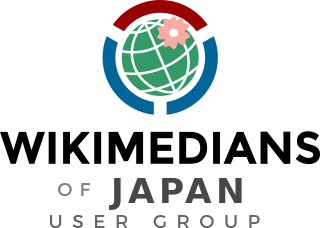
Results of the Landscape Survey of Japanese Wikipedia Editors in 2023
Please see the first half.
▶Use of the “Forum(s)”
Q14. Tell us everything you have used in the “Forum(s)” for users of the Japanese Wikipedia.
- “Talk Page” and “User Talk” are the most popular features of the “Forum(s),” accounting for about 60% of all usage.
- The group with high levels of involvement (years of editing > 10 years/frequency > 4 times a week) have a high overall usage rate, while 30% of the group with low levels of involvement (years of editing < 6 months/frequency ≤ once in 3 months) said they had never used any of them. It is speculated that by making it known that there are various places for discussion and by lowering the hurdle for participation, the utilization rate will increase.
Figure 14. Use of the “Forum(s)”
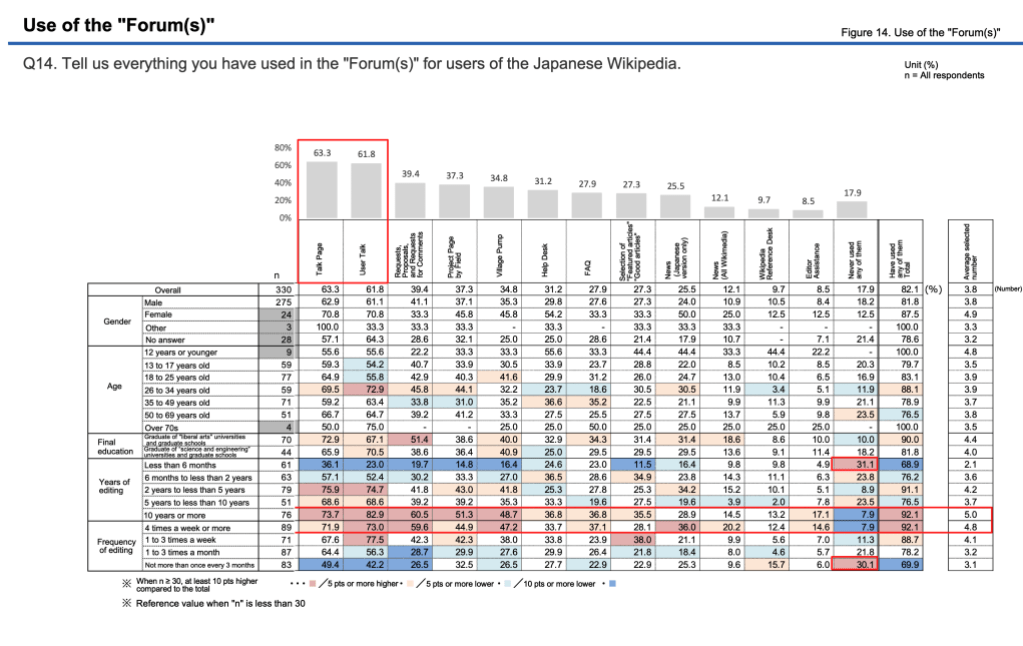
Figure 14-2. Use of the “Forum(s)” (Overlapping)
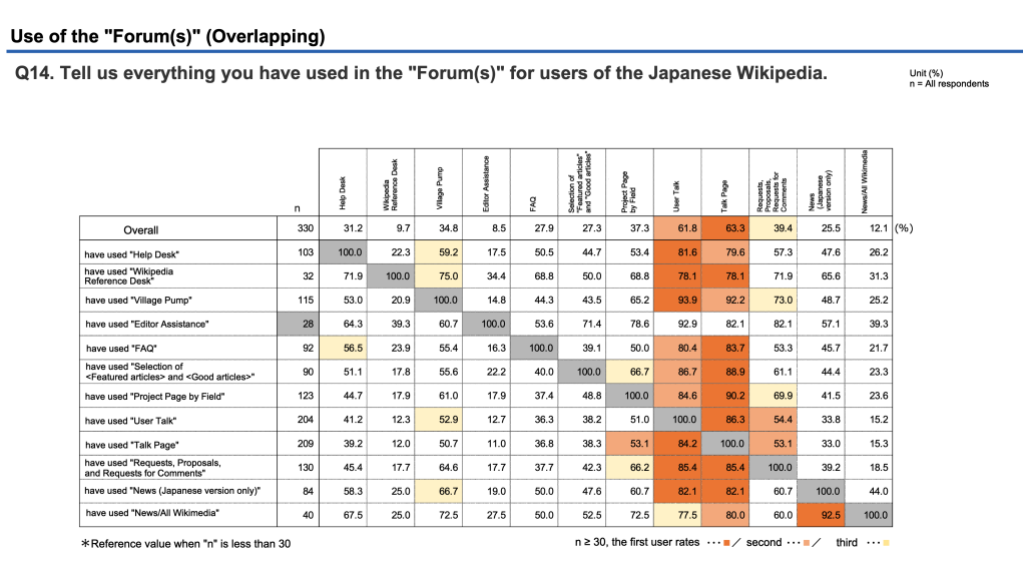
- n ≥ 30, the first, second, and third user rates
- Reference value when “n” is less than 30
▶Satisfaction with the “Forum(s)”
Q15. How satisfied are you with the Forum(s)?
- The top three satisfactory features are “Selection of ‘Featured articles’ and ‘Good articles’,” “Talk Page,” and “News (Japanese version only).” A mechanism for selecting excellent articles and a forum for discussion on the content of articles are thought to contribute to user satisfaction.
- There is room to listen to the opinions of users and improve the “Wikipedia Reference Desk” and “News/All Wikimedia” where the “Not satisfied” ratio is particularly high.
Figure 15. Satisfaction with the “Forum(s)”
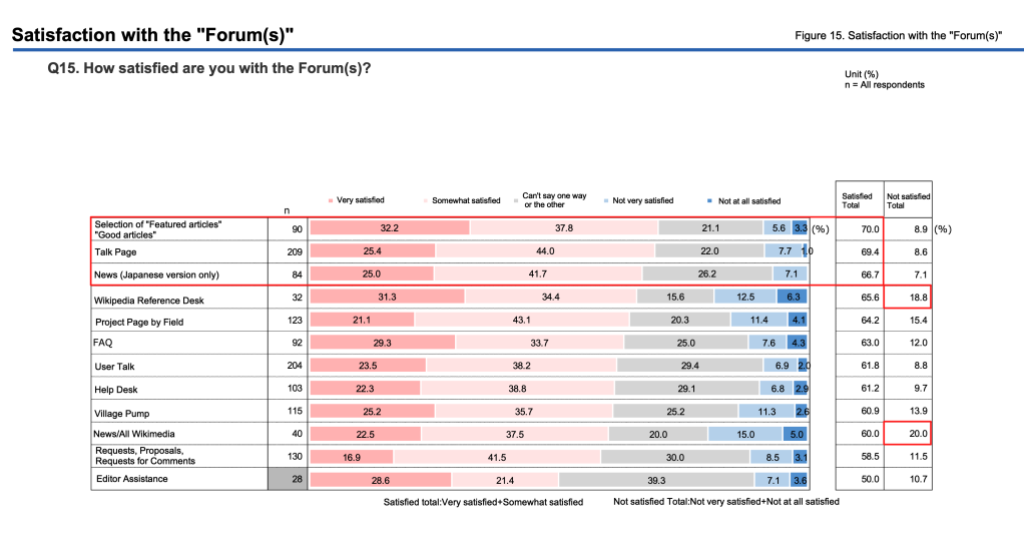
4.Complaints and Comments
▶Complaints
Q16. Do you have any complaints about editing the Japanese Wikipedia? Please select all that apply.
- The top three complaints are “Vandalism,” “Uneven coverage across fields,” and “Difficult-to-understand guides and rules.”
- The group with high levels of involvement (years of editing > 10 years/frequency > 4 times a week) is more likely to mention “Vandalism” as a complaint.
- Those aged 50 to 69 and those with longer years of editing are more likely to choose handling of problematic users and relationship issues (such as harassment of editors and disagreement) as a complaint.
Figure 16. Complaints
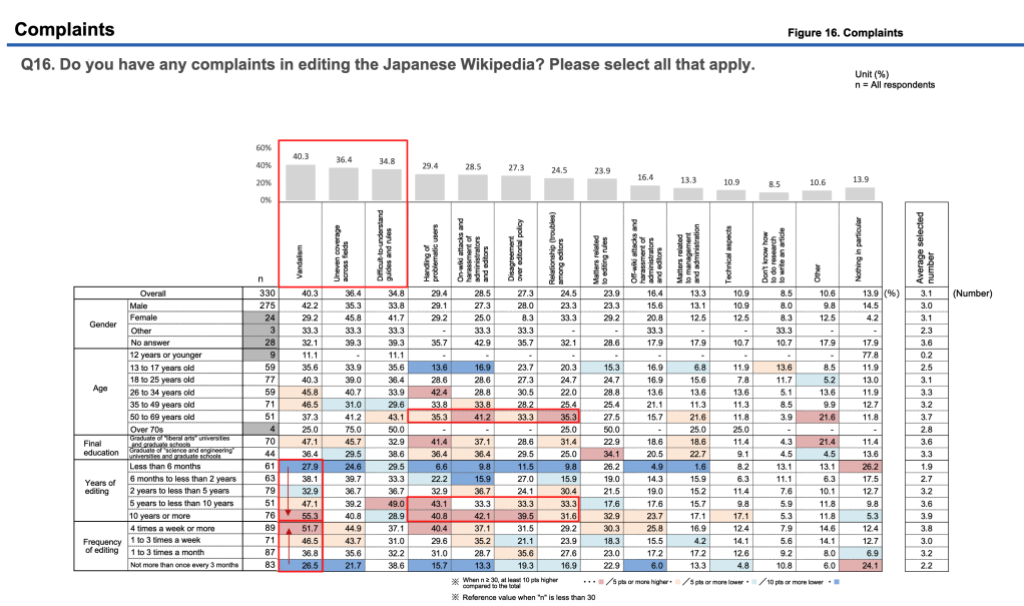
▶Comments on the Japanese Wikipedia *Excerpts from open-ended responses
Q17. Feel free to write your opinions and comments on the Japanese Wikipedia.
- The approximate editing frequency of the respondent is shown in the parenthesis.
- We have changed some of the responses to protect the privacy of the respondents.
< Years of Editing and Writing > Less than 6 months
| [Positive Opinion] |
| * The content is very rich and the fact that it covers various fields and genres is great. (Frequency: Not more than once every 3 months)I will continue to contribute to Wikipedia to the best of my ability. * (Frequency: 1 to 3 times a month)I would like to do my best as the e-sports field has not yet been developed. (Frequency: 4 or more times a week) |
| [Points for Improvement and Requests] |
| * There are editors who ignore the policy, who try to force their ideas through, and who over-condemn the lack of a description of the situation abroad. I want something to be done about this. (Frequency: Not more than once every 3 months) * New participants are often unaware of the “Verifiability.” Unless we make that known, the quality of Wikipedia as an encyclopedia will only deteriorate. Along with writing articles, it is also important to “raise” quality. (Frequency: 4 or more times a week) * I have been involved in editing on Wikipedia for three months. I was surprised that there was no active discussion in the Talk Page. I can see some bias across various genres and articles. (Frequency: 4 or more times a week) * Most of the pages are full of errors and abandoned as they are, which can do far more harm than good. Administrators are not aware of this. When you ask AI a question, the answer is often based on information from Wikipedia, and the answer is usually wrong. You will have to radically rethink the project management policy. (Frequency: 4 or more times a week) |
< Years of Editing and Writing > 6 months to less than 2 years
| [Positive Opinion] |
| * In my time with Wikipedia, I have often seen issues with copyright ownership. Articles for deletion were reported almost every day. However, in the Japanese Wikipedia, there are efforts to solve the problem through stable activities of a few administrators and Village Pump discussions. (Frequency: Not more than once every 3 months) * The good thing is that anyone can share their knowledge through Wikipedia. I want Wikipedia to be safe for everyone to use by improving the reliability of articles. (Frequency: 1 to 3 times a month) |
| [Points for Improvement and Requests] |
| * Perhaps because the number of Japanese speakers is small, I feel that there are no articles or there is a difference in the content quality compared to other language versions. It would be great if more people could easily participate in editing. (Frequency: 1 to 3 times a week)Incorrect Japanese is seen here and there. (Frequency: Not more than once every 3 months) * It seems somewhat exclusive in the fields of history, archaeology, and philosophy. (Frequency: 1 to 3 times a month) * Recently, I had a conflict over the editorial policy with users who did not or would not understand the policy. The explanation based on the policy was not accepted, and the motivation for editorial activities in the relevant field was severely reduced. At this time, I would like to ask all users to understand the policy. I feel the editorial activities and discussions will proceed more smoothly and efficiently if users understand the “foundation.” (Frequency: 1 to 3 times a month) |
< Years of Editing and Writing > 5 years to less than 10 years
| [Positive Opinion] |
| * I think one of the reasons for the wide variation in the quantity and quality of articles in different fields is the unbalanced ratio of editors. Such imbalance can be corrected to some extent by having more people with various attributes participate. I am thinking about what I can do for that. (Frequency: 4 or more times a week) |
| [Points for Improvement and Requests] |
| * In many cases (as in other languages), the English version is the best and other language versions including the Japanese version are poor. I can read English, but I am also a native Japanese speaker, and I think it is more convenient for Japanese speakers to be able to read in Japanese. In order to provide knowledge not only to the elite who can understand English fluently, but also to the general public who can understand their native and official languages, it is necessary to increase the number of translators (regardless of language). (Frequency: 1 to 3 times a month) * In order to improve its accuracy as an encyclopedia, I think it is important to have a solid primary source. The number of articles with sources is much higher than it was 10 years ago, but I feel that there are many articles that are summaries of curated media or that rely on personal blogs or social media. (Frequency: 1 to 3 times a month) * I want to request to increase the number of administrators (Frequency: 1 to 3 times a week) * There are few guidelines for writing by field (Frequency: Not more than once every 3 months)There are many editors who treat articles as if they own them, so it is difficult to edit them. (Frequency: 1 to 3 times a month) * There are too few ways to curb unhealthy user activity. It seems to me that sincere editors are more likely to suffer a loss. (Frequency: 1 to 3 times a week) |
< Years of Editing and Writing > 10 years or more
- Editors with 10 years or more of editing experience have more specific ideas for improvement and requests, such as “events to increase the number of writers,” “nurturing the younger generation,” “holding of offline meetings,” “grants of awards and titles,” and “use of mascot characters.”
| [Positive Opinion] |
| * It is very useful for entertainment and education, thank you very much (Frequency: Not more than once every 3 months) * Wikipedia is of great help to me. I personally have made a lot of mistakes, but I am gradually improving my skills through editing. I look forward to continuing to work for the project. (Frequency: 4 or more times a week) *I often write in the minor genre, but look forward to continuing to work for the project. (Frequency: 4 or more times a week) |
| [Points for Improvement and Requests] |
| * I want the ability to report thoughtless accounts (Frequency: 1 to 3 times a month) * In areas where there are few writers, low-quality articles are left unedited, so I hope that more events will be held to increase the number of writers. Events tend to focus on Tokyo and other metropolitan areas, so look out for regional areas as well. (Frequency: 4 or more times a week)I want to ask for the development of the environment so that it is easier to write more diverse and substantial articles in accordance with international standards such as the English version and other Western languages. (Frequency: 4 or more times a week) * The current Jawp has fewer participants than in the past, especially those who are capable of writing, and there has been no progress in improving previously written articles of low quality, such as unsourced articles. In order not to make Jawp an obsolete relic, I think it is necessary to raise the reputation of Wikipedia as an encyclopedia by discussing how to nurture beginners, and by working to strengthen the more important articles rather than attracting attention with novel-like articles and unusual articles which are often ridiculed as “Wikipedia literature.” (Frequency: 4 or more times a week) * I admire the fact that the online media of this volume has been run by volunteers for almost 20 years, but there are issues because it is run by volunteers. We need to make sure that these places will not be lost. (Frequency: 4 or more times a week) * I feel sad that all the offline meetings are gone. (Frequency: 4 or more times a week) * They are too tolerant of unsourced statements. (Frequency: 1 to 3 times a month) * There are few editors. I often see editing without source. There are many new posts with sloppy articles. (Frequency: 1 to 3 times a month) * I have seen several cases where a certain administrator strongly exercised their administrative authority only within a specific genre (acting tyrannically because there is no one who would remonstrate with them). I feel it is very bad. (Frequency: 1 to 3 times a month) * There are still fields where articles are lacking. Explanation of technical background is insufficient or difficult to understand. We need a mechanism to direct resources to article writing and content enhancement rather than discussion. It seems to me that they exclude editors and writers with proven but somewhat problematic results. I feel those who are discussing are close-minded. They are too rule-bound. I take the establishment of the Wikimedians of Japan User Group as a positive move. I am quietly cheering for them. (Frequency: 1 to 3 times a week) * Wikipedia has a long history, so I think it is time to grant awards and titles to excellent writers, and to offer special benefits to good writers. (Frequency: 1 to 3 times a week) * I would like to see Wikipedia’s official mascot character, Wikipede, increase its presence. I have a strong image that the unofficial character Wikipe-tan has been stealing Wikipede’s opportunities to play an active role for many years, so I am always dissatisfied. (Frequency: 4 or more times a week) * Winning a large number of participants and improving the quality of the content are two sides of the same coin, but without both, I believe there is no future for Wikipedia. (Frequency: 4 or more times a week) * The fact that there are so few ways to combat vandalism and harassment is undermining my motivation to edit articles. (Frequency: 4 or more times a week) |
Questionnaire Report, December 24, 2023
Wikimedians of Japan User Group

Can you help us translate this article?
In order for this article to reach as many people as possible we would like your help. Can you translate this article to get the message out?
Start translation
